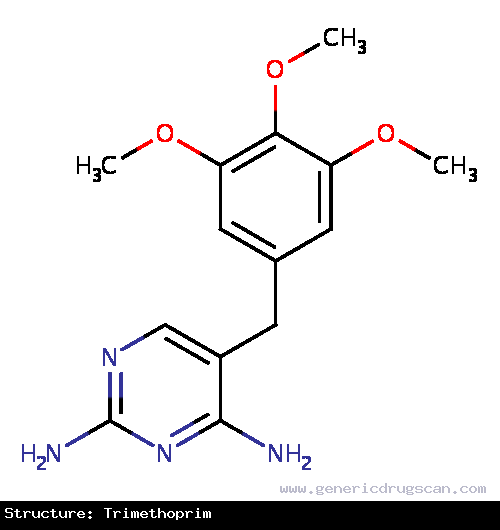Trimethoprim Drug: Indication, Dosage, Precaution, Side Effect , Storage, Category Type and corresponding Brands - www.genericdrugscan.com
Trimethoprim
Drug Status in USA : ApprovedDrug Status in Canada : Approved
pronunciation
pronounced as (trye meth' oh prim)
Why is this medication prescribed?
Trimethoprim eliminates bacteria that cause urinary tract infections. It is used in combination with other drugs to treat certain types of pneumonia. It also is used to treat traveler's diarrhea. Antibiotics will not work for colds, flu, or other viral infections.
This medication is sometimes prescribed for other uses; ask your doctor or pharmacist for more information.
How should this medicine be used?
Trimethoprim comes as a tablet to take by mouth. It usually is taken one or two times a day. Trimethoprim may be taken with or without food. Follow the directions on your prescription label carefully, and ask your pharmacist or doctor to explain any part you do not understand. Take trimethoprim exactly as directed. Do not take more or less of it or take it more often than prescribed by your doctor.
What are the precautions to be followed?
Before taking trimethoprim,- tell your doctor and pharmacist if you are allergic to trimethoprim, sulfa drugs, diuretics ('water pills', oral diabetes medications, or any other drugs.
- tell your doctor and pharmacist what prescription and nonprescription medications you are taking, especially phenytoin (Dilantin) and vitamins.
- tell your doctor if you have or have ever had anemia or liver or kidney disease.
- tell your doctor if you are pregnant, plan to become pregnant, or are breast-feeding. If you become pregnant while taking trimethoprim, call your doctor immediately.
What are possible side effects of this medication ?
Trimethoprim may cause side effects. Tell your doctor if any of these symptoms are severe or do not go away:- upset stomach
- vomiting
- diarrhea
- rash (hives)
- itching
- difficulty breathing or swallowing
- sore throat
- fever or chills
- mouth sores
- unusual bruising or bleeding
- yellowing of the skin or eyes
- paleness
- joint aches
- bluish-colored fingernails, lips, or skin
How to store the medication and dispose it of after its use later?
Keep this medication in the container it came in, tightly closed, and out of reach of children. Store it at room temperature and away from excess heat and moisture (not in the bathroom). Throw away any medication that is outdated or no longer needed. Talk to your pharmacist about the proper disposal of your medication.
Drug Category/Class
- Antimalarials
- Anti-Infective Agents, Urinary
- Antibacterials for Intramammary Use
- Sulfonamides and Trimethoprim
- Sulfonamides and Trimethoprim Incl. Derivatives
- Trimethoprim and Derivatives
- Sulfonamides and Trimethoprim for Intramammary Use
- Folic Acid Antagonists
- Cytochrome P-450 CYP2C9 Inhibitors
- Cytochrome P-450 CYP2C8 Inhibitors
- Cytochrome P-450 CYP2C9 Inducers
- Cytochrome P-
| Prescribed | For the treatment of urinary tract infections, uncomplicated pyelonephritis (with sulfamethoxazole) and mild acute prostatitis. May be used as peri... |
| Weight : | 290.3177 |
| Structure | Trimethoprim |
 | |
| Formula | C14H18N4O3 |
Trimethoprim has 2 Brands listed
| Patrim (60 ml) | Trimethoprim (160 mg) |
Search Generic Drugs alphabetically
